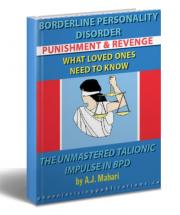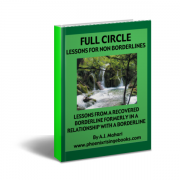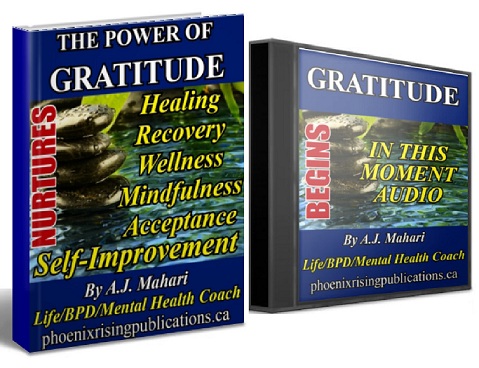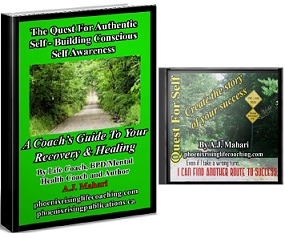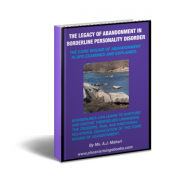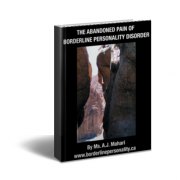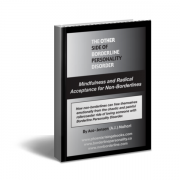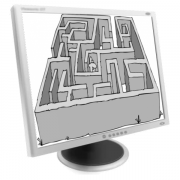Hope and Borderline Personality Disorder used to be thought of as incongruent or as polar opposites. It wasn't uncommon, in the past, for those diagnosed with BPD to be told there was no hope for them - that there was no hope to be effectively treated or to get better and/or recover. This is something I've known for years wasn't true. I recovered over 14 years ago. I have for the last 12+ years tried to bring this message of hope to others here on my website. It is now a message finally being written about in books that are written by professionals. Borderline Personality Disorder and hope are no longer polar opposites. Having BPD does not have to be a reason for living without hope. That said, hope can still be a challenge for those with BPD. There is, however, all kinds of hope for improving the quality of your life, for learning how change your suffering into manageable pain and for continuing to get better if you have Borderline Personality Disorder.
Those who are family members, Loved ones or relationship partners with someone with BPD in their lives need to learn as much as they can about what all of this Hope for those with BPD may or may not mean in their own lives.
Borderline Personality and Hope
Hope is not usually a word associated with Borderline Personality Disorder (BPD). Why not? One major reason may be the reality that to vastly improve from BPD on the road to recovery takes time. It cannot be done quickly. To improve and to begin the long road to recovery from BPD involves a conscious choice to do so. It means un-winding years of damage and distorted thinking. It also means slowly peeling back layer after layer of untold pain. Another major reason hope is not often a word associated with BPD has all to do with the amount of damage that BPD wreaks not only in the life of the "borderline" but also in the lives of anyone and everyone that comes into contact, association, and or relationship with or to the person that has BPD. Countless lives are affected. And there is enough pain to go around.
Often those who are on the outside, yet so severly affected by the actions of the person with BPD, end up with believing that everything the person with Borederline Personality Disorder does is somehow aimed at them. This, in my experience was certainly not the case. In the throes of active BPD the borderline is not able to think his/her way through the miriad of cognitive distortions which are the misperceptions under which they operate. The borderline really cannot decipher and ferret out what is reasonable and "adult" in the here and now when triggered into a dissociative "reality" from the past.
The good news is that there really is hope. The journey to recover and heal from BPD has not been adequately mapped out by professionals. This leaves a great measure of this journey up to each individual borderline. It is possible to get better. Getting better is a slow and evolving process of working through the cognitive distortions and restucturing the way in which one thinks. It also very much involves learning to stay in the present by being very consciously aware of what triggers one and by having coping strategies in place to deal with these inevitable dissociative triggered episodes.
- The Shame of Abandonment in BPD
- From False Self To Authentic Self In BPD - Getting In Touch With Your Inner Child
- BPD and Abandonment
- Finding Hope From the Polarized Reality of BPD
- Preparing For Recovery From BPD
- Emotion Dysregulation in BPD
- Rage Addiction in Borderline Personality Disorder
If you are borderline you were (for one reason or another) unable to emotionally mature beyond childhood or adolescents without interruption. The interruption is what BPD is. BPD is largely a very intelligent and extensive system of coping mechanisms that were adopted and developed to deal with the original trauma and or stressors that worked effectively in the past and which no longer are effective for you "adult" life. These coping skills that you've adopted were maladaptive. Though they were healthy and sane responses to the insanity that you may have experienced in your developmental years in the here and now of "adult relationships" your reponses are no longer healthy ones.
If you are borderline you have learned how to interpret life in a pattern of consticted thinking which limits the sum total of your experience to black and white thinking. You were not able to learn to hold or experience conflicting emotions simultaneously. There were likely too many unresolved conflicts in your life which felt as if they threatened your survival. (your actual physical surivival or your emotional survivial -- ability to be who you were -- identity) These reactions and interpretations that you carry with you from past experiences of deep emotional hurt and or abuse must be unlearned.
Purchase all 3 of ebooks for >NON BORDERLINES packaged together with or without audio.
Non Borderlines - You can purchase 6 ebooks packaged together with or without audio.
Those with BPD and/or Non Borderlines can purchase A.J. Mahari's 3 "Core Wound of Abandonment" series ebooks packaged together with or without audio.
Why Is There Hope
There is hope because no one of us is ever a finished product. There is hope because no matter what you believe right now you do not have to hold to that forever if it is not working for you. Whatever we do or say that causes chaos and pain in our lives we can learn to stop choosing. Change is scary, but, if you can open yourself to the reality that change is what enables us to grow and to heal our pain than you can learn to dream. Once you learn to dream and you begin to envision something other than what you currently know or what you have always known --the way you experience your life and your relationships -- then you can also embrace the reality of hope.
To learn to hope one must learn to be calm and accepting of one's vulnerability. This can be very difficult to do as you unwind the miriad of defence mechanisms that you have needed so far in your life to feel safe. However, in the pursuit of hope you need to take some time and think about the illusion of safety that has permeated your existence thus far. You see, most borderlines think that when they are in "control" they are safe. The illusion here is that you are never really in "control" of anyone else. In fact the more you seek to control others in your life the more you are actually NOT in "control" of yourself. The hope in working so hard to overcome the very, very painful patterns established in borderline thinking, feeling and acting is that you can come to understand that you can only control yourself.
Okay, so right here and now, you are reading this and you may well say to yourself, but I can't control myself because I hurt too much, or I need to too much, or no one understands, or no one cares and so forth. Choose to take in "reality" and push out the "illusions" of old. YES you can control yourself. YES you can take back the control over the emotions, namely fear and hurt, that fuel the anger and the rage of your young and innocent inner-child that so have over-run you until now. HOPE! You are in control of the very choices that mold and shape your life, whether you consiously accept this or not. You have the choice to STOP being a victim of the past and to start being a person who has survived it. Work to heal from it. THE ONLY WAY TO HEAL FROM IT IS TO GREIVE it and then LET IT GO AND CHOOSE TO MOVE ON Herein lies so very much hope!
- The Puzzle and Mystery of Hope on the Other Side of BPD
- Inside The Borderline Mind
- The Shame of Abandonment In BPD
- Breaking Free of The Borderline Maze - Recovery For Nons
- Facing the Facts of BPD - On The Other Side For Nons
- Overcoming Denial About BPD and Love
Hope and the reality of bringing your hopes and dreams to fruition depends upon you. Yes YOU! Each of us is responsible for who it is that we allow ourselves to be once we reach adulthood. BPD is real, yes, but hope and recovery are just as real. You can choose to let go of the patterns and the dynamics that have kept you a prisoner of your pain. Free yourself from the chains of BPD. The way to begin is by learning how to hope. Hope is a key ingredient in faith. It will take both hope and faith to give you the strength that is required to courageously step out of all that you've known and to reach for the mental health that you deserve.
HOPE is a feeling that what is wanted will happen. It is desire accompanied by expectation. It is the positive opposite of all that borderline thinking perpetuates. Hope can move mountains. At some point you must learn to trust yourself over the nature of being "outer-directed". The answers that you seek on your journey to recovery lie within you. When you look to yourself instead of others you will find your "true" nature and identity and you will learn to trust that who the "borderline you" is, is but a shadow of who you really are. Hope lives on in the knowledge that potential is everywhere. Reach for your potential today. As you contemplate this remember, you are the master of the sabotage that would put a halt to your healing. You have that power, no one else.
I recovered from Borderline Personality Disorder 14 years ago now. Others have recovered and yet others are in recovery. If nothing else has opened the door to hope in your soul thus far, let this. Let the reality that people are getting better and or have gotten better be your motivation to seek the peace that you know you need and want. There is no peace in a soul that is mired in Borderline Personality Disorder. Give hope a chance -- what do you have to lose?
You have everything to gain. Begin by affirming yourself. It will feel fake and dumb to begin with. But it can be the foundation upon which you begin to cognitively restructure the idenity that sits under your false-persona anxiously awaiting the freedom that your choosing hope can and will bring to your soul.
I have long wondered what has hurt me more -- being borderline, or healing from BPD. Truly, being borderline was the most painful thing I think I could ever know. If you are borderline you know that pain. If you are in the throes of BPD you may not know the hope and peace I speak of here. Trust someone's words. Trust my words. Let my words be your source of hope until you replace them with you own conception, understanding and experience of hope.
BPD is not a life-sentence. Borderlines can choose change. Borderlines can recover. Borderlines are intelligent and resourceful. Put your intelligence and resourcefulness to work for positive good. Do not be afraid to hope. Hope is the seed planted that will yield your recovery, in time. Plant that seed of hope and reap what the kind of health and competence that you seek, long for and *so* deserve to know.
© Ms. A.J. Mahari January 17, 2000 with additions February 10, 2009







